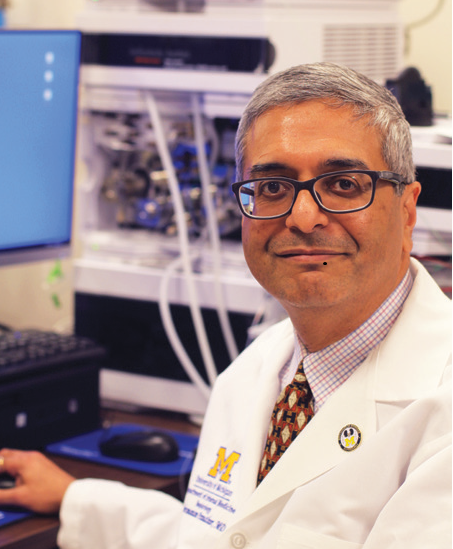
Fellow in Nephrology and Transplantation, 1999-2001
Lessons learned while a nephrology and transplant fellow at Washington University School of Medicine have “profoundly influenced” Subramaniam “Sub” Pennathur, MD, as he advanced in his own academic and research careers in nephrology.
Pennathur is currently the Chief of the Division of Nephrology at the University of Michigan and the Norman Radin Chair of Nephrology Research. He also serves as Director of the Michigan O’Brien Kidney Center (one of eight O’Brien centers that focus on kidney research) and is Director of the Molecular Phenotyping and Metabolomics, Michigan Nutrition and Obesity Center (one of 12 Nutrition and Obesity Research Centers (NORC), both funded by the National Institutes of Health.
The nationally respected physician-scientist says his decade of clinical and research training at Washington University inspired a lifelong passion for research. “I had the unique opportunity to pursue diabetes and nephrology research there,” he says. “My research, therefore, has focused on understanding the metabolic basis of diabetic complications, with particular emphasis on diabetic kidney disease. Significantly, my training in analytical mass spectrometry at the NIH-supported Resource Center at Washington University under Dr. Jay Heinecke’s mentorship enabled me to learn and utilize state-of-the-art mass spectrometry to identify key protein and metabolite alterations in disease states.”
WU faculty mentors have included Aubrey Morrison, MBBS, and Michael Rauchman, MD, both in the Division of Nephrology, and endocrinologists Philip Cryer, MD, (former Division Chief, Endocrinology) and Clay Semenkovich, MD (current Division Chief, Endocrinology), where Pennathur also served as a fellow in endocrinology, diabetes and metabolism from 1996-1999.
“I have had many mentors at Washington University who I want to acknowledge with gratitude because they taught me the craft of being an excellent clinical nephrologist,” he adds. “Daniel Coyne was my Program Director. Dave Windus was my outpatient clinic mentor. Daniel Brennan, Will Ross, Marcos Rothstein, Jay Delmez, Steve Miller are among the many others who have had a lasting impact on my growth as a clinician.”
An introduction by Dr. Morrison to Jim Shayman, MD, the Agnes C. and Frank D. McKay Professor of Internal Medicine and Pharmacology at the University of Michigan and a former alum of the WU Nephrology Division led to Pennathur joining the faculty at the University of Michigan in 2006. Ten years later, he was named Chief of the Division Nephrology. “We found an immediate home in Michigan because of its Midwestern values, collaborative environment and commitment to excellence, which is very similar to the environment at Washington University,” explains Pennathur.
He maintains strong connections with his former WU fellows and says that his fondness for St. Louis will remain strong. “I met my wife Revathy and started our family there,” he says fondly. “Both of our daughters were born while I was a nephrology fellow.”

Family activities include lots of outdoor adventures. “Our goal is to visit all of the National Parks in the United States before I retire,” he says.
He adds, “Washington University has truly outstanding clinical and research training. It’s gratifying now as Division Chief of an outstanding nephrology program in Michigan to be able to put into practice the lessons I learned at WU in fostering research, building clinical programs and mentoring the next generation of physician scientists and clinicians.
Profile written by Stephanie Stemmler